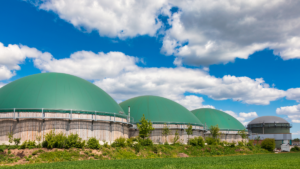Stainless Steel and Anaerobic Digestion go hand-in-hand, with stainless steel being the main material of choice for many manufacturers of anaerobic digestion and biogas production plants.

Anaerobic digestion is the decomposition of organic waste (also known as biomass) by naturally occurring microorganisms in the absence of oxygen. The organic waste could include sludge from wastewater treatment manure, food waste and agricultural waste.
The process produces biogas which can subsequently be burned to produce heat. It can be used locally or can be fed into the electricity grid, or it can be cleaned and used in the same way as natural gas or to fuel a vehicle. The material left over after digestion, called digestate, can be used as a fertiliser and soil improver.
Anaerobic digestion is a widely used and increasingly popular renewable energy source. Interestingly, many large farms and wastewater treatment plants also have biogas production plants on their sites. Biogas is becoming part of the suite of renewable energy sources such as the sun, wind and hydropower – the world’s green energy resources.
The stainless steel and anaerobic digestion sector is a niche but thriving industry, with plants producing biogas for many years around the world. More than 14,560 biogas power plants operate in Europe, with total capacity approaching 7.9 GW.
Special Metric Materials is proud to support this growing industry. Our stainless steel tubes, fittings and valves provide reliable protection from aggressive and corrosive biogas production processes.
Read on to find out more about Stainless Steel and Anaerobic Digestion.
Why is Anaerobic Digestion growing in popularity?
Biogas production from organic waste is appealing because:
- It produces energy.
- There is a constant stream of organic waste to use as raw material.
- It reduces the amount of waste going to landfill.
- Land can be dedicated to food production rather than the production of material for biomass systems.
One of the biggest reasons why Anaerobic Digestion is becoming popular is because of its ability to reduce greenhouse gas emissions.
Biogas comprises about 60% methane and 35% carbon dioxide, as well as some other gases including the toxic hydrogen sulphide. Methane and carbon dioxide are both greenhouse gases that are damaging to the environment. The Anaerobic Digestion process captures these gases, which usually would be released directly into the atmosphere from the decomposition.
Biogas production process
The Anaerobic Digestion and biogas production process is as follows:
- Waste is brought to an anaerobic digester plant and is fed into it.
- Bacteria then breaks down the organic matter through the use of acidogenic bacteria, acetogenic bacteria and methanogens.
- Digestion in the plant is optimised through a controlled temperature of approximately 40°C and a pH level between 5.5 and 8.5.
- Heat treatments are used to render germs and bacteria useless. This can involve either hygienisation or pasteurisation. This process is one of the reasons why stainless steel is used so commonly for anaerobic digestion equipment – it can withstand the corrosive gases produced at this stage.
- At this point, biogas can then be used to fuel an engine which drives a generator to produce electricity. Biogas could also be cleaned and then used in a natural gas distribution system, or it could even be compressed and used to power vehicles.
- Any residual waste from the stainless steel biogas plants is often used as fertiliser.
Stainless Steel and Anaerobic Digestion
Stainless steel is the material of choice in the production of most biomass tanks for Anaerobic Digestion because:
- It is sustainable.
- It is not harmful to propel during its production or its use.
- It has a naturally occurring protective layer due to the inclusion of chromium.
- Its protective layer gives it a relatively long-life.
- Stainless steel tanks can be constructed just about anywhere quickly and efficiently, thus reducing construction costs.
- It is highly reliable meaning it has minimal repair costs
- The reuse and recyclability of stainless steel is high, meaning its impact on the planet is low. It is thought that stainless steel has an average recycled content of more than 60%
- Stainless steel is highly reliable when used for gas and water tightness.
- Stainless steel has low maintenance costs.
- Its low maintenance costs, long life, ability to be recycled and residual value means that stainless steel is an economical and profitable choice
Stainless steel equipment in biogas production plants
Because of its ability to withstand corrosion and the many other advantages listed above, stainless steel is used for much of the equipment in biogas production plants. This equipment and parts include:
- Digesters – Stainless steel plates are used for the digesters as they can be assembled quickly. This reduces construction time and they require less maintenance, mainly due to its excellent corrosion resistance against H₂S (Hydrogen sulphide) and ammonia.
- Pumps and valves – These are most likely to help transport corrosive materials meaning stainless steel is an excellent material choice.
- Agitators – Agitators are used to homogenise the temperature of biomass and are always in contact with corrosive materials. This again makes stainless steel the metal of choice.
- Pipes and fittings – Stainless steel is perfect for pipes and fittings as it has excellent corrosion resistance and formability.
- Purification applications – When biogas is produced it usually contains many impurities that must be removed. This is usually done through a dehumidification process and stainless steel is often used to build these dehumidifiers.
We hope you enjoyed this blog on stainless steel and anaerobic digestion. Special Metric Materials is supplying an increasing number of biogas production plants across the UK by supplying high-quality and reliable stainless steel tubes, fittings, flanges and valves.
Stainless steel is seen as a very cost-effective and reliable material for the Anaerobic Digestion and biogas production industry, and Special Metric Materials is proud to support this renewable energy industry.


